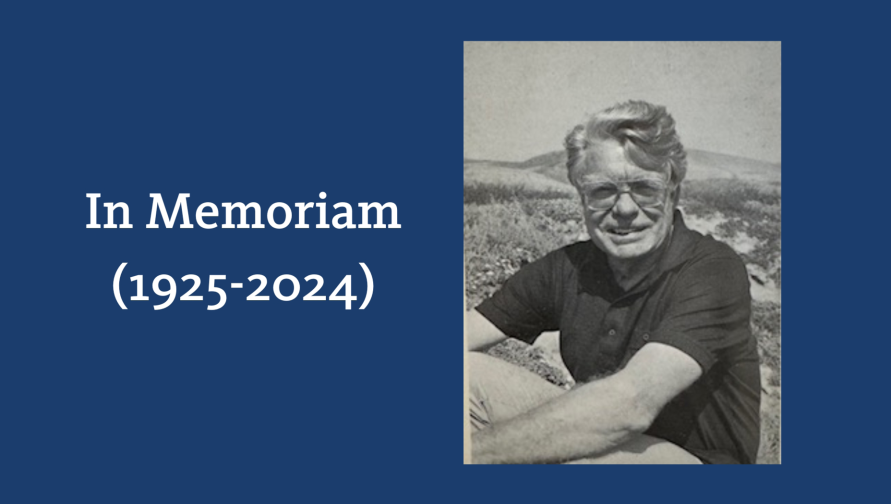
It is with great sadness that the Department of European Languages and Studies announces the recent passing, on 6 January 2024, of our beloved colleague, Herbert Lehnert. He received a "green" or "natural" burial at Joshua Tree National Monument on January 12th. It was a place that he loved and shared with colleagues, students and visitors over the years on lively tours and hikes through the landscape.
Herbert Lehnert was born in Lübeck, Germany in 1925. He served in the German Wehrmacht during World War II and was ultimately confined in a POW camp. After his release in 1946, he studied at the University of Kiel, Germany and received his Ph.D. in 1952 with a dissertation on self-image in the work of the poets Stefan George, Hugo von Hofmannsthal and Rainer Maria Rilke. After graduation, he was offered a position at a German academic high school, the Katharineum (founded in 1531), which was not just his alma mater, but also that of Thomas Mann (1875-1955), the subject of much of his scholarly research.
Lehnert emigrated to North America in 1957 and his first university post was a year at Western Ontario University. From there he moved to Rice University in Houston, TX, where he taught from 1958-68; followed by a year at the University of Kansas. In 1969, he came to the fledgling University of California campus at Irvine, where he was the founding chair of the Department of German and Russian, after the original foreign language department divided into individual language segments. At UCI he taught in German from 1969-1994, when he became an emeritus and Research Professor. He continued advising students, collaborating with colleagues and contributing to the intellectual life of the School of Humanities for many years thereafter. He never missed a lecture.
Herbert Lehnert was an astonishingly productive scholar. To many, it seems that he published daily—or at least weekly. His colleagues would regularly find offprints and sometimes whole volumes in their mailboxes. He received numerous prestigious scholarships and invitations, including two NEH Fellowships and a Guggenheim Fellowship.
As noted, Lehnert's main focus was the work of his fellow Lübecker and Katharineum alum, Thomas Mann. He was an internationally renowned Mann specialist, having produced countless articles as well as seven monographs and edited collections, volume 6 of the critical edition of Mann's essays in the standard Frankfurt edition, and a biographical volume on Mann's early years. This was Lehnert's last book, published in 2020.
In 1998, the Thomas-Mann-Society in Lübeck honored him for his extraordinary scholarly work with the Thomas Mann Medal; a distinction that meant a great deal to him.
Lehnert also wrote a well-received history of German literature from Jugendstil to Expressionism which went into a second edition. This latter opus took him a lot of time because he felt that he had to read or re-read the complete text of every work he included in the history.
Scholarship, for Lehnert, was not primarily a way to keep score or to advance professionally. It was, rather, an ethical imperative for him. He lived the life of the mind. He dedicated his scholarly skills to expanding our knowledge in all the areas he investigated. Lehnert was an inspiring colleague and a well-rounded person. He loved to ride his bike around Irvine and frequently camped in the surrounding state parks, which often involved rigorous hiking. Lehnert easily scaled these obstacles, while many of his much younger colleagues struggled to keep up with him.
In honoring his memory, we express our deepest condolences to his wife Inga Lehnert, his children, and the rest of his family, as well as his friends, colleagues and the countless students whose lives he enriched.
